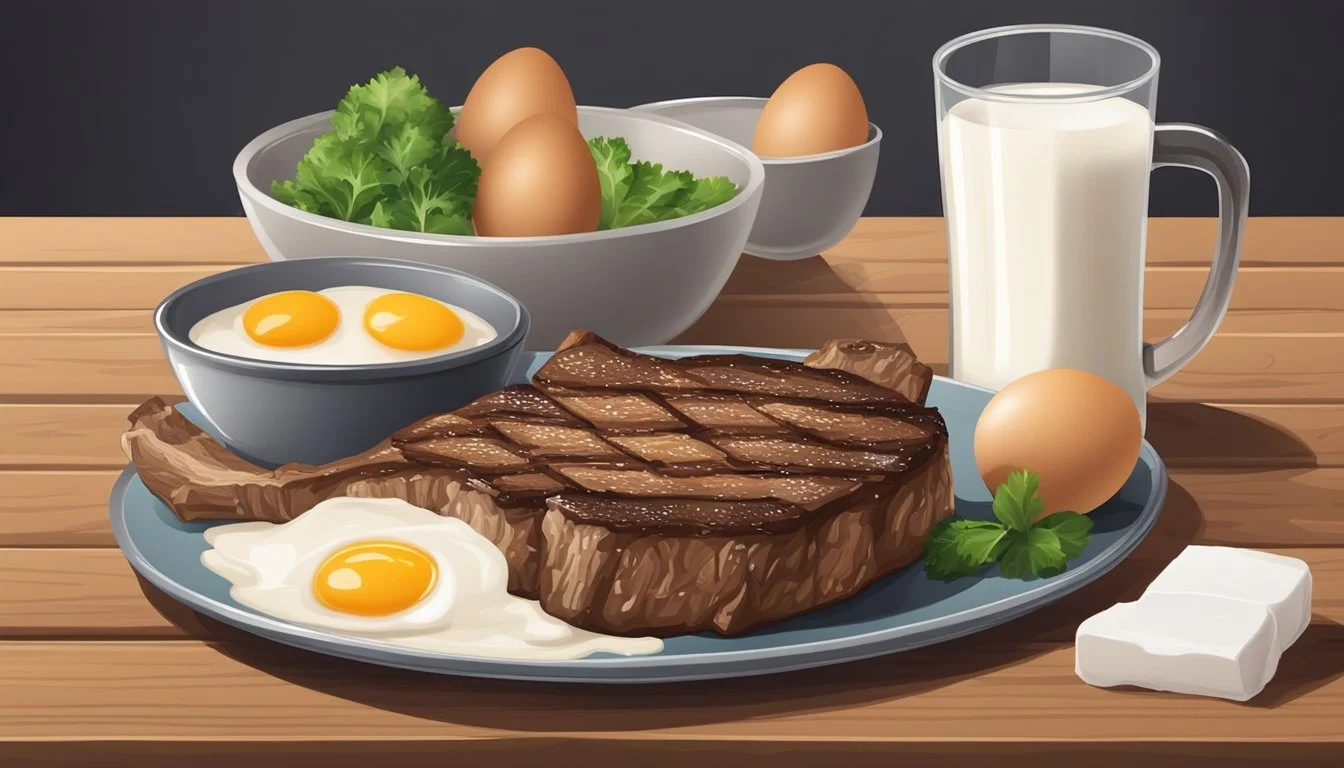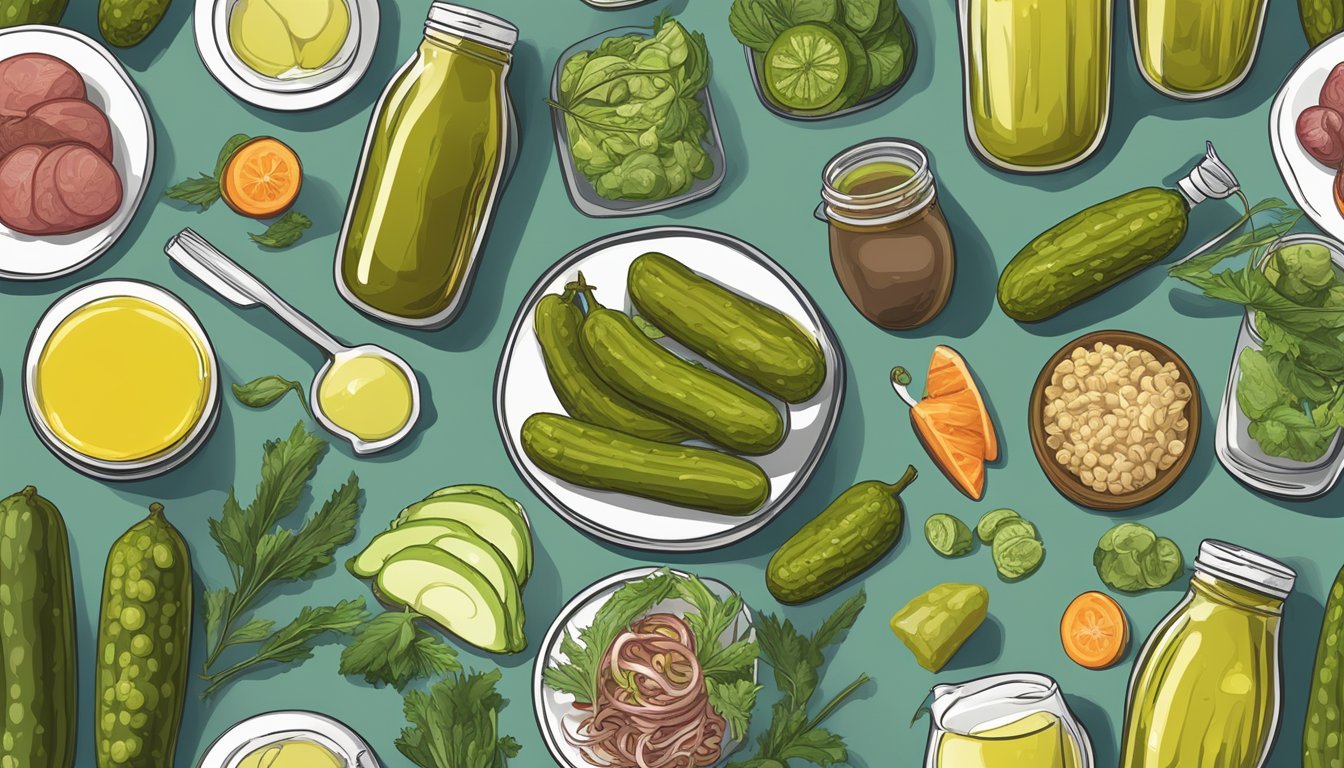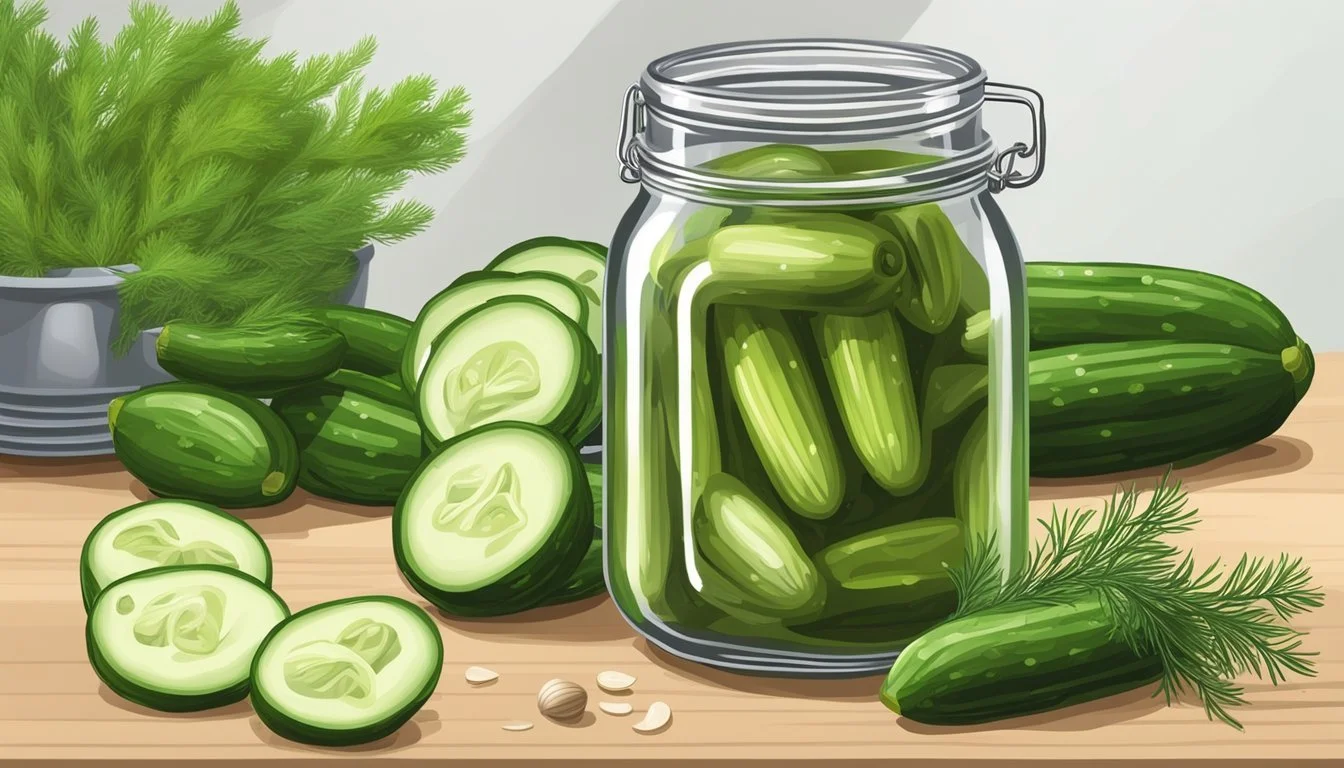Can You Drink Pickle Juice on a Carnivore Diet?
Unveiling the Truth
The carnivore diet is a regimen that restricts consumption to animal products and excludes all plant-based foods. Adherents of this diet often have questions about what is permissible to consume, especially when it comes to beverages. Hydration is a key factor for the success of any diet, and for individuals on the carnivore diet, the choices are typically limited to animal-based or zero-carb options. Pickle juice, which is essentially the brine in which pickles are fermented, presents a curious case. It is not derived from animal sources, which raises the question: can one drink pickle juice while adhering to a carnivore diet?
Pickle juice consists of water, vinegar, salt, and sometimes spices and herbs, which may initially seem at odds with the carnivore diet’s strict guidelines. However, considering the diet's emphasis on maintaining adequate hydration and electrolyte levels, pickle juice could be argued to have a place in the diet for some individuals. The juice from pickles contains electrolytes like sodium, which can be beneficial, especially for those who are active and may need to replenish salts lost through sweat.
It is important to note that the carnivore diet is highly restrictive and interpretations may vary. For those considering incorporating pickle juice into their regimen, it is essential to check that the juice does not contain added sugars or plant-based additives, and to consume it in moderation. The primary focus should remain on consuming animal products, but for some, pickle juice may offer a way to diversify their beverage options and maintain electrolyte balance.
Understanding the Carnivore Diet
The carnivore diet focuses on the consumption of animal products and the elimination of carbohydrates to derive nutritional benefits, often resulting in a state of ketosis.
Foundational Principles
The carnivore diet is grounded on the basis that human ancestors predominantly ate meat and fat, and that modern diseases can be mitigated by reverting to such dietary practices. This diet includes:
High Protein: Sourcing from animal meat ensures a high intake of protein.
High Fat: A significant amount of energy is derived from animal fats.
Zero/Low Carbohydrate: No plant-based foods are consumed, thereby reducing carbohydrate intake to minimal or zero, which can lead to ketosis—a metabolic state where fat is the primary source of energy.
Permitted Foods
Foods that are typically consumed on the carnivore diet include:
Meat: Beef, chicken, pork, lamb, and other meats
Fish and Seafood: All forms of fish and shellfish
Eggs: Chicken, duck, and other animal eggs
Certain Dairy Products: High-fat dairy like butter and some cheeses, although some individuals choose to exclude dairy for purity or lactose intolerance reasons
These foods provide essential nutrients and proteins, and advocates suggest that this diet can lead to various health benefits such as weight loss and improved metabolic health.
Commonly Excluded Items
Items generally excluded from the carnivore diet are any foods not sourced from animals, including:
Carbohydrates: All types of grains, legumes, fruits, and vegetables
Sugars: Processed or natural sugars
Plant-Based Proteins: Nutrients from plant sources are not consumed
This strict avoidance of non-animal products is believed to remove anti-nutrients and reduce inflammation associated with carbohydrate consumption.
Health Benefits and Nutritional Concerns
When considering the inclusion of pickle juice in a carnivore diet, one should be aware of its potential health advantages and the nutritional implications it may carry.
Potential Health Benefits
Pickle juice may offer various health benefits, particularly due to its content of vitamins, minerals, and electrolytes. Here are some specifics:
Electrolytes: Rich in sodium and potassium, pickle juice can help replenish electrolytes lost through sweat, potentially aiding in hydration.
Vitamin E: A powerful antioxidant that may contribute to immune function and heart health.
Amino acids: It contains some amino acids, which are the building blocks of protein, although in very small quantities.
Despite not being a significant source of protein or fat, which are the mainstays of a carnivore diet, pickle juice might still complement it by providing some micronutrients that support overall well-being and metabolic health.
Considering Nutritional Gaps
Whilst there are potential benefits, one should also consider the nutritional gaps in pickle juice, especially concerning a carnivore diet:
Fat and Protein: Pickle juice contains negligible amounts of fat and protein, which are essential for energy and muscle maintenance on a carnivore diet.
Amino Acids: The few amino acids present in pickle juice are not sufficient to meet the daily requirements of a person on a carnivore diet.
Vitamins and Minerals: Certain necessary vitamins and minerals may be limited; thus, reliance on pickle juice for these nutrients could lead to deficiencies.
Heart Disease and Blood Pressure: High in sodium, excessive consumption of pickle juice could be a concern for individuals with high blood pressure or risk of heart disease.
Individuals considering pickle juice for its purported benefits should balance consumption with these nutritional considerations to maintain overall health and gut health while adhering to the carnivore dietary framework.
Pickle Juice and Its Components
This section examines the ingredients of pickle juice, its role in electrolyte balance, and its potential drawbacks when considering a carnivore diet.
What is in Pickle Juice?
Pickle juice is the liquid left over from pickling cucumbers, typically containing water, vinegar, salt, and an array of spices. It may also include sugars and additives to enhance flavor. The specific components can vary depending on the brand or homemade recipe used. For those on a carnivore diet, it's critical to inspect the ingredients to avoid any non-animal sourced items.
Electrolytes and Hydration
Pickle juice is rich in electrolytes, including sodium, potassium, calcium, and chlorine. These electrolytes are crucial for maintaining hydration, especially for individuals who engage in high levels of physical activity. The high sodium content, in particular, can help replenish salts lost through sweat.
Sodium: Integral for nerve function and fluid balance.
Potassium: Vital for muscle function and heartbeat regulation.
Calcium: Essential for bone health and muscle movements.
Chlorine: Integral for digestion through the production of stomach acid.
Potential Downsides
While pickle juice offers hydration and electrolyte benefits, it may not be suitable for everyone on a carnivore diet due to its vinegar and potential sugar content. Consuming pickle juice also means ingesting vinegar and other possible plant-based additives, which can deviate from the all-animal product ethos of a strict carnivore diet. Additionally, the high sodium content might not be appropriate for individuals with certain health conditions requiring sodium restriction.
Fluids on Carnivore Diet
The Carnivore Diet prioritizes animal products and eliminates plant-based foods, impacting beverage choices to ensure adherence to its principles and nutritional goals.
Recommended Beverages
On the Carnivore Diet, individuals should focus on animal-sourced fluids. The most recommended beverages are:
Water: Essential for life and hydration.
Bone Broth: Rich in minerals and supportive of joint and digestive health.
Milk: An animal-sourced beverage that can provide a source of fat, protein, and nutrients like calcium — preferably full-fat and unsweetened.
These beverages align with the diet’s focus on minimizing carbs and maintaining a ketogenic state.
The Role of Water
Water is the foundation of hydration on any diet, and its importance is amplified on the Carnivore Diet due to the absence of fruit and other foods with high water content. It is important for:
Hydration: Replenishing fluids lost through daily activity and metabolism.
Function: Assisting in every bodily function from digestion to temperature regulation.
Alternative Fluids and Options
While traditional plant-based drinks like tea and coffee lack animal origins, they are often considered acceptable in moderation on the Carnivore Diet because they can be zero-carb, sugar-free, and provide a caloric intake close to water. However, individuals should ensure that:
Coffee and tea are unsweetened and consume in moderation.
Sparkling water can be a fizzy alternative to plain water, promoting hydration without added sugars.
When incorporating dairy, choose options with no added sugar to maintain the ketogenic aspect of the diet.
Beverages heavily processed or containing plant-based additives, sugars, or significant levels of carbs should be avoided to stay within the diet's guidelines.
Carnivore Diet Adaptations
When adapting to a carnivore diet, individuals must assess their tolerance for certain food groups and understand how various inclusions might affect their dietary goals.
Strict vs Relaxed Approaches
Strict carnivore dieters adhere to a food intake consisting of only animal products, targeting primarily meat, fish, eggs, and certain dairy products like cheese and butter. They focus on consuming protein and fat while avoiding carbs to maintain a state of ketosis.
On the other hand, a relaxed carnivore approach may allow for minor deviations that include condiments and beverages with very low carb content, provided they do not interfere with the diet’s objectives or the individual's metabolic state.
Incorporating Pickle Juice
One such consideration for those following a relaxed version of the carnivore diet is incorporating pickle juice, which is not purely animal-based but has negligible carbs. Although not traditionally part of the regimen, it's utilized for its electrolytes, which can aid hydration and alleviate certain adaptation symptoms like muscle cramps or keto flu.
Consideration for inclusion should be based on individual goals and reactions within the following parameters:
Dairy inclusion: If dairy products are tolerated, pickle juice may be similarly acceptable.
Ketosis maintenance: Ensure that the carb content of pickle juice does not disrupt ketosis if that’s a goal.
Protein and fat ratios: Balance intake with ample animal protein and fat to stay aligned with carnivore principles.
When embarking on a carnivore diet and considering additions like pickle juice, individuals should consult with a healthcare provider to ensure these adaptations are appropriate for their unique dietary needs.
Common Pitfalls and How to Avoid Them
When following a carnivore diet, it's essential to be mindful of beverage choices that may conflict with diet principles. This section outlines potential obstacles related to drinking pickle juice and provides guidance to navigate these concerns effectively.
Overconsumption Concerns
On a carnivore diet, individuals focus on consuming primarily animal products, avoiding sugars, carbohydrates, and processed foods. Pickle juice, typically high in sodium and sometimes containing sugars and additives, can lead to unintended weight gain and disrupt ketosis, a state the carnivore diet aims to maintain.
Sodium Intake: High amounts can lead to water retention and increased blood pressure.
Sugar Content: Even small quantities of sugar can interfere with the diet's goals.
Additives: Many store-bought pickle juices contain preservatives that are considered processed foods.
To avoid these issues, individuals should:
Check labels for sugar and carbohydrate content.
Opt for homemade or organic pickle juice with no added sugars.
Limit consumption to small quantities, if included at all.
Addressing Cravings and Variability
A carnivore diet may lead to cravings due to its restrictive nature. Although pickle juice can offer a flavor change, its suitability depends on whether it aligns with diet goals.
Cravings for Variety: Can lead to choosing flavored drinks that contain dairy, minerals, and fiber.
Processed Foods: Pickle juice is often classified as a processed item.
To manage these cravings while remaining true to the diet's strict parameters, individuals should:
Consider alternatives such as unsweetened bone broth, rich in minerals, to satisfy savory cravings.
Use spices or seasonings permitted on the diet to enhance the taste of allowed beverages like water.
By attentively monitoring beverage choices and adhering to the core principles of the carnivore diet, individuals can avoid common pitfalls and maintain their commitment to this dietary lifestyle.
Final Considerations and Recommendations
When adopting the carnivore diet, one must consider the nutritional implications of all dietary choices. This section provides insights into expert opinions and ways to tailor the carnivore diet to individual needs while considering pickle juice consumption.
Expert Opinions and Research
Experts in nutrition emphasize the carnivore diet as one that focuses on animal products, predominantly consisting of protein and fat, and eliminating carbohydrates. Research on the carnivore diet is not extensive, but it is known for its potential health benefits, including muscle maintenance and improved gut health. When it comes to pickle juice, which is not an animal product, its direct relevance to the diet is questionable. However, pickle juice may offer electrolytes such as sodium and potassium, which are essential, especially in the initial phases of the diet when the body is adjusting to carbohydrate restriction and may lose fluids.
Nutritional Value: Pickle juice could provide some micronutrients that are important for the body. These micronutrients include:
Sodium: crucial for fluid balance.
Potassium: aids in muscle function.
Magnesium: important for many biochemical reactions.
It is imperative to note these micronutrients are available in animal products too. Those following the diet strictly would gain electrolytes through bone broth or salted meats.
Personalizing Your Carnivore Diet
Each individual's response to the carnivore diet can vary. Some may find it necessary to incorporate certain non-animal-derived substances like pickle juice for its electrolytes, which could benefit hydration and muscle function. Nonetheless, it is vital to always prioritize animal products and ensure that any additions align with the goals of the diet.
Tailoring the Diet:
Consider personal goals and health status.
Monitor body's reaction to dietary adjustments.
Include animal-based options rich in electrolytes first.
In summary, while the carnivore diet traditionally excludes plant-derived substances such as pickle juice, there may be scenarios where its inclusion for electrolyte replenishment could be contemplated, provided it does not counter the overarching principles of the diet. Individuals are advised to make informed choices in consultation with health professionals.





